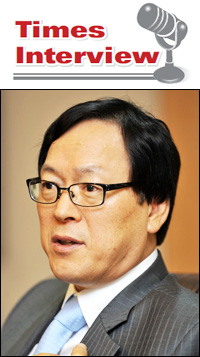
Eximbank CEO calls lenders ‘domesticated’

The head of one of the nation’s state-run lenders said that Korean banks should revamp their business models so as to better serve retail customers and play a bigger role in helping Korean companies overseas.
He stressed that leading domestic lenders, such as KB Kookmin, Shinhan, Woori and Hana, should give up their interest margin- and fee-oriented business models and instead focus on seeking ways to flex their muscles in overseas markets.
Kim Yong-hwan, chief executive of the Export-Import Bank of Korea (Korea Eximbank), believes they deserve most of the criticism launched toward them. In Kim’s view, they aren’t contributing to the economy as much as they should in difficult economic times like these, as they have mastered the art of milking more out of customers in borrowing costs and sucking the lifeblood out of small- and medium-sized businesses.
“Commercial banks still rely on expanding deposit-loan interest margins and all sorts of fees to increase profit. They should cut the proportion of this income by a big portion,’’ Kim said in an interview with The Korea Times.
“The banking industry should create new values by doing more to improve the lives of consumers and improve personal finance. I think it has come to a point where the government has to force them to open their deposit-loan interest margins and pressure them into competition that will force them to reduce gaps.’’
Data from the Korea Federation of Banks show that lenders offer 3 to 4 percent interest on one-year deposits, while charging borrowing costs of 5 to 10 percent on one-year loans. They charge between 1,000 to 2,000 won at the counter for every 1 million won transferred to accounts of other banks. Then there are the fees of 500 to 1,000 won charged for money transfers and non business-hour withdrawals at automated teller machines (ATMs).
Kim said that the petty business nature of Korean banks is a reflection of global market mediocrity. It’s imperative that these banks look beyond national borders and hire more talented individuals from overseas.
“Despite all the bold statements, local banks’ efforts to go global have been lackluster and devoid of direction. They don’t have the people who can play internationally and they need to invest more to acquire and train these kind of people.’’
Kim, a former senior vice governor of the Financial Supervisory Service, also stressed said that banks need to be more responsible to companies when they are in trouble amid economic turbulence. He picked the case of KB Kookmin Bank and Sungdong Shipbuilding and Marine Engineering, where the lender declined to provide more credit to save the company.
“Sungdong suffered from knock-in, knock-out products amid big economic turbulence in the global financial crisis, but Kookmin declined to help. It was inappropriate.”
Korea Eximbank is the main creditor of Sungdong. Eximbank and Kookmin fought each other over the company and now both of them plan to file lawsuits over Kookmin’s defaulted loans and forward losses.
Kim said that his bank will file a 17 billion won compensation suit against Kookmin in mid-July as the bank declined to pay back money since it withdrew from the creditors’ group in September.
Eximbank manages Korean loans to developing economies and helps finance offshore business deals for local firms. <The Korea Times/Kim Jae-won>


